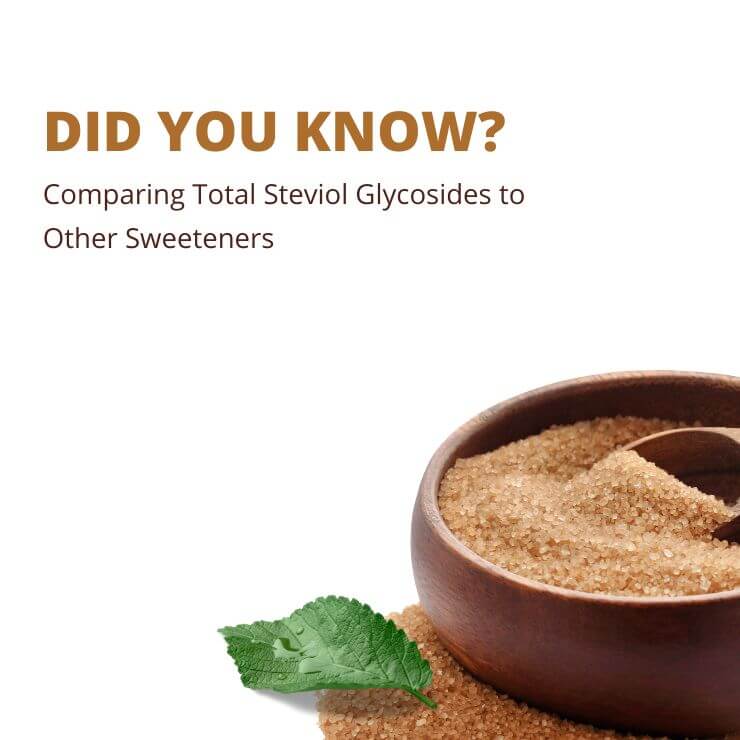When it comes to choosing a sweetener for your dietary needs, it’s helpful to compare Total Steviol Glycosides (TSG) with other popular sweeteners to make an informed choice. Here’s a comparison between TSG and some common sweeteners
Sugar (Sucrose):
- Calories: Sugar is calorie-dense, providing around 16 calories per teaspoon, while TSG is calorie-free.
- Impact on Blood Sugar: Sugar rapidly raises blood sugar levels, making it unsuitable for diabetics. TSG has a minimal impact on blood sugar.
- Taste: Sugar provides a classic sweet taste but contributes to tooth decay.
Artificial Sweeteners (e.g., Aspartame, Sucralose):
- Calories: Artificial sweeteners are typically calorie-free, similar to TSG.
- Taste: They offer sweetening without sugar’s calories but may have an aftertaste that some people find undesirable.
- Health Concerns: Some studies have raised concerns about potential health risks associated with long-term artificial sweetener consumption. TSG, derived from a natural source, may be perceived as a safer alternative.
Honey:
- Calories: Honey is calorie-dense, providing around 64 calories per tablespoon, significantly more than TSG.
- Nutrients: Honey contains trace amounts of vitamins and minerals, while TSG provides negligible nutrients.
- Impact on Blood Sugar: Honey has a moderate glycemic index and can impact blood sugar levels. TSG has a minimal effect on blood sugar.
Agave Nectar:
- Calories: Agave nectar is calorie-dense, providing about 60 calories per tablespoon, more than TSG.
- Fructose Content: Agave nectar is high in fructose, which can raise concerns about its impact on liver health. TSG is fructose-free.
- Taste: Agave nectar has a mild, neutral flavor, while TSG can have a slightly different taste profile.
Steviol Glycosides (TSG):
- Calories: TSG are virtually calorie-free, making them suitable for weight management.
- Impact on Blood Sugar: TSG does not significantly raise blood sugar levels, making them suitable for diabetics and those aiming to control sugar intake.
- Taste: TSG provides sweetness without calories and is derived from a natural source, which many people find appealing.
- Safety: TSG has been evaluated and approved as safe by regulatory authorities in various regions.
Ultimately, the choice between sweeteners depends on your dietary goals, taste preferences, and any health considerations. TSG stands out as a natural, calorie-free option that offers sweetness without many of the drawbacks associated with sugar and some artificial sweeteners. When used in moderation and following regulatory guidelines, TSG can be a valuable addition to a balanced diet.








